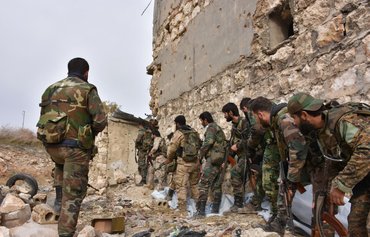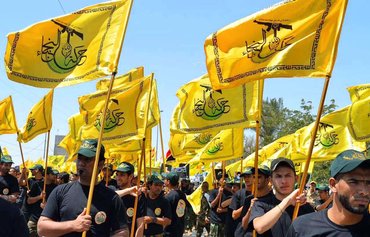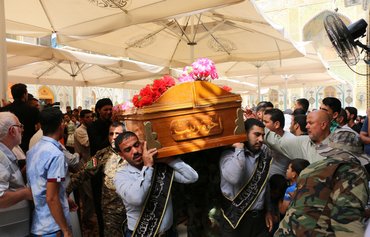Tens of thousands of Iraqis, who are part of militias backed by Iran's Islamic Revolutionary Guard Corps (IRGC), are fighting alongside the Syrian regime in Aleppo and other parts of Syria, experts tell Diyaruna.
The presence of these IRGC-backed Iraqi militias in Syria is protracting the war and fueling sectarian divisions and regional unrest , they say.
Roughly 30,000 Iraqis are estimated to be part of the ongoing conflict, according to politician and former Iraqi MP Taha al-Luhaibi.
"This is an approximate number and might go up and down each month based on assessments by the militia command from which these fighters take their orders," he told Diyaruna.
IRGC-backed Iraqi militias have had a presence in Syria since 2011 , he said, adding that their "participation in this war is no longer a secret as the media and social networking sites have exposed this issue".
According to al-Luhaibi, Harakat al-Nujaba militia leader Akram al-Kaabi said his group had sent "10,000 fighters in one month alone" to support regime forces in Aleppo.
"In addition to al-Nujaba, there are nine other Iraqi Shia factions currently fighting in Syria, the most prominent of which are Abu al-Fadhal al-Abbas brigade, al-Youm al-Mawoud brigade, al-Khorasani brigade, Asa'ib Ahl al-Haq as well as some members of the Badr organisation," al-Luhaibi said.
" These Iran-backed militias are responsible for the continued unrest and sectarianism in our region ," he said.
Iraqi militias a constant presence
At the start of the Syrian conflict, he said, these militias were transported in buses from Iraq's Karbala province to al-Nakhib, and from there to al-Waleed border crossing with Syria.
"After that, they were flown directly into Damascus, or to Beirut from which they were then sent by land to Syrian cities to fight alongside Hizbullah," al-Luhaibi said.
"Some of those fighters were children of no more than 13 or 15 years who were tricked and bribed with money," he said, adding that "there are numerous videos that prove armed militias recruited children to fight in a war zone".
"Many of those fighters died in Syria and their bodies were repatriated to Iraq," he said.
Bodies of the deceased fighters are flown from Damascus Airport to Najaf Airport, said Iraqi Centre for Strategic Studies researcher Yahya al-Kubaisi.
The overt presence of Iraqi militias in Syria dates back to the arrival of the Abu al-Fadhal al-Abbas militia in 2013, he told Diyaruna.
These militias gradually began to build up a stronger presence, and their activities broadened, he said: "Then, we started to hear about and see several Iraqi groups that are linked to Iran in belief and in organisational structure that were fighting on Syrian soil."
In early October, strong evidence of this presence emerged via a video that was circulated online showing captives from Harakat al-Nujaba who had been ambushed by Syrian opposition factions in Aleppo, al-Kubaisi said."
Armed interference has significantly protracted the Syrian crisis and has extended the life of the Syrian regime, said Iraqi MP Mohammed al-Karbouli, who heads the al-Hall bloc., adding that external interventions have mired the region in a state of unrest and religious extremism.
"For us to be able to contain this violence, we need to find a broader space for dialogue and political solutions," he said.

![Iraqi fighters from the Asa'ib Ahl al-Haq militia carry the coffins of eight comrades killed in Syria during their March 16th funeral in the Iraqi city of Najaf. [Haidar Hamdani/AFP]](/cnmi_di/images/2016/10/25/6423-Iraq-najaf-militia-600_384.jpg)







[Gibberish] from the heroic Iraqis.
Reply2 Comment(s)
Lucky him whose sister is Zainab!
Reply2 Comment(s)